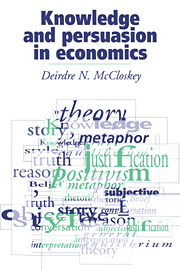Book contents
- Frontmatter
- Contents
- List of figures and tables
- Preface
- Acknowledgments
- Part I Exordium
- Part II Narration
- Part III Division
- 5 The Science word in economics
- 6 Three ways of reading economics to criticize itself
- 7 Popper and Lakatos: thin ways of reading economics
- 8 Thick readings: ethics, economics, sociology, and rhetoric
- Part IV Proof
- Part V Refutation
- Part VI Peroration
- List of works cited
- Index
6 - Three ways of reading economics to criticize itself
Published online by Cambridge University Press: 01 February 2010
- Frontmatter
- Contents
- List of figures and tables
- Preface
- Acknowledgments
- Part I Exordium
- Part II Narration
- Part III Division
- 5 The Science word in economics
- 6 Three ways of reading economics to criticize itself
- 7 Popper and Lakatos: thin ways of reading economics
- 8 Thick readings: ethics, economics, sociology, and rhetoric
- Part IV Proof
- Part V Refutation
- Part VI Peroration
- List of works cited
- Index
Summary
It is early days yet for an interpretive and humanistic economics, straddling the dichotomies of modernism. But an economics brought back into the conversation of humankind has already a few things to whisper across the disciplinary walls, economic knowledge reappearing as self-knowledge (the genre was invented by Hirschman 1981, 1984).
First: if you're so smart
Economics should apply to itself. At one level the application is well advanced. Economics is a particularly thoroughgoing example of rationality, turning back on itself in, for example, the conflict between Austrian and neoclassical views of market equilibrium. Jack Amariglio (1990b) has argued that modernist economics, like modernist everything else, contained a contradiction, what Paul Wendt calls in a comment on Amariglio “the immanence thesis,” that “postmodernism is immanent in modernist economics” (Wendt 1990, p. 47). In essentials the contradiction is of longer standing, though sharpened in modernism. It has been called “the aporia [indecision] of the Enlightenment”. The philosopher Stanley Rosen decribes it as “a conflict between mathematics and Newtonian science on the one hand and the desire for individual and political freedom on the other … The understanding is in essence the formulation of and obedience to rules. Since there are no rules for the following of rules … the understanding must be a spontaneous ‘project’ … of freedom …, Kant's unstable attempt to ground reason in spontaneity” (Rosen 1987, pp. 3, 4, 8).
- Type
- Chapter
- Information
- Knowledge and Persuasion in Economics , pp. 71 - 84Publisher: Cambridge University PressPrint publication year: 1994



